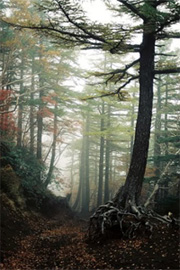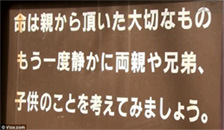 Aokigahara, a forest located at the base of Mount Fuji is considered the most haunted place in all of Japan. That may very well be the case. Because it also has the dubious distinction of being the world’s second most “popular” destination (after the Golden Gate Bridge) for suicide. From CNN World:
Aokigahara, a forest located at the base of Mount Fuji is considered the most haunted place in all of Japan. That may very well be the case. Because it also has the dubious distinction of being the world’s second most “popular” destination (after the Golden Gate Bridge) for suicide. From CNN World:
Aokigahara Forest is known for two things in Japan: breathtaking views of Mount Fuji and suicides. Also called the “Sea of Trees,” this destination for the desperate is a place where the suicidal disappear, often never to be found in the dense forest.
An April 9th article in the UK Mail Online features a sad story and short documentary about Aokigahara, the suicides, and a guy named Azusa Hayano, who has studied and tended to the forest for more than 30 years.
Though Mr Hayano is unable to give any definitive answer as to why so many kill themselves at Aokigahara, he has gained great insight into the behaviour of those desperate enough to venture in with no intention of coming back.
In this haunting documentary he tells the film-makers how clues left among the trees can indicate what went through a person’s mind in the moments before they took their own life – or, as is sometimes the case, had a change of heart and chose to live.
His interest in death and despair may seem to stem from morbid fascination, but as the film rolls on it becomes clear that this softly-spoken, pensive man acts out of a desire to understand and prevent these tragedies.
Hayano speculates that those who come to the forest to end their lives have become emotionally isolated by the increasingly impersonal and lonely way of life that emerged with the internet; “Now we can live our lives being online all day. However, the truth of the matter is we still need to see each other’s faces, read their expressions, hear their voices so we can fully understand their emotions – to coexist.”
There’s certainly is a lot of truth in that. Texting, social media and even cell phone connections are no substitute for face-to-face communication. Modern society leaves too many of us feeling alone and hopeless. But I also think that with the Japanese specifically, this contemporary despair may be due to the residual effects of an empty worldview. They have nothing beyond this earthly existence to hope for.
Although today fewer that 20% of Japan’s people claim any personal religion, the country’s philosophical roots are in Buddhism. It’s a belief system that recognizes evil and suffering in the world and rightly sees the cause as humans’ inability to suppress their craving and desires. But Buddhism, like most Eastern religions offers no solutions to the human dilemma other than one’s own willpower.
And that’s the problem. As L.T. Jeyachandran points out, writing in Beyond Opinion: Living the Faith We Defend; “we as humans know what is right but repeatedly find ourselves in the unenviable position of not being able to do what we know is right.”
Eventually that realization, conscious or not, creates a sense of hopelessness and despair. And because we can’t save ourselves from our own destructive yearnings (or “be good for goodness’ sake” as the atheists like to suggest) – we need a Savior.
Jeyachandran continues;
Salvation is procured by Christ only because humans are incapable of saving themselves. This comes through clearly in the Christian message. The Buddhist view that one can get rid of craving by one’s own effort is doomed to failure on account of the reality of human frailty…
…The strongest argument against the attraction of Eastern religions lies not merely in an individual pursuit of Christian holiness but rather in the practice of a visible and demonstrable Christian community.
Like, for example, this – from Samaritan’s Purse:
After the tsunami and earthquake in 2011, a new wave of God is moving across
Japan as Christians from all over the world help the people of the Tohoku region…
Wouldn’t it be wonderful if this “wave of God” washed through the Sea of Trees?
There are signs posted at various places throughout the Aokigahara forest with messages hoping to dissuade the despondent:

“Your life is a precious gift from your parents. Please think about your parents, siblings and children. Don’t keep it to yourself. Talk about your troubles.”
“Please reconsider what you’re about to do.”
“Please consult the police before you go off to die!”
What if they included a couple signs with these messages?
For the Son of man is come to seek and to save that which was lost.
~ Luke 19:10 ~
Come unto Me, all you who labor and are heavy laden, and I will give you rest. Take My yoke upon you and learn from Me, for I am gentle and lowly in heart, and you will find rest for your souls. For my yoke is easy and My burden is light.
~ Matthew 11:28-30 ~




